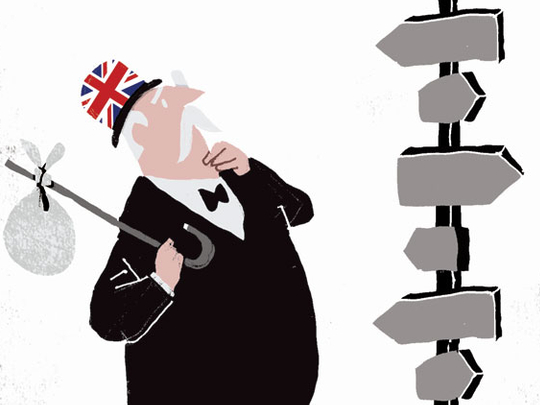
Britain has spent more than half a century wrestling with the fact of shrinking global influence. It has not got any easier over time. Bouts of hubris alternate with spasms of self-doubt. On occasion, prime ministers — Margaret Thatcher and Tony Blair come to mind — have seemed to turn back the tide. They have learnt soon enough that Canute was right.
A foreign policy fit for the present century — a belated riposte to Dean Acheson’s wounding observation about losing an empire and failing to find a role — is overdue. This need not be an angst-ridden exercise in declinism; rather a chance for Britain to play to its still considerable strengths. There will be plenty of room in the emerging multipolar world for middle-ranking powers confident enough to look outwards. Effectiveness, though, demands realism — and something that can be called a plan.
The task has been given urgency by economic circumstance. Britain has suffered a permanent fall in income and living standards. Global aspirations must be cut from less plentiful cloth. The flimsy pretence that Britain has a role as a pocket superpower will not survive the next round of defence cuts.
Nor will others stand idly by while Britain fiddles with its geopolitical compass. Ever since the Suez debacle, British foreign policy has been about seeking to balance allegiance to a so-called special relationship with the US with reluctant recognition that it cannot escape the consequences of decisions taken by its continental neighbours. Neither relationship any longer looks self-evidently secure.
The US is turning towards the Pacific. Washington still needs allies, but Britain can expect a less consequential role. Closer to home, the European powers are deepening integration to save the euro. Politics is pulling Britain in the other direction. The danger is that the deep eurosceptic fog now descending over the Channel is prelude to a permanent rupture. For their part, the likes of China, India, Turkey and Brazil are jostling for power in a world no longer owned by the West.
Britain has to decide where it fits in. The proposed takeover of British-based defence company, BAE Systems, by the Franco-German-led aerospace venture, EADS, is a reminder that old dilemmas have not gone away. Emotion draws Britain West across the Atlantic but hard calculation as often pulls it back to Europe.
The putative deal is more salvage operation than merger. BAE thought it could strike out on its own in the US. It badly miscalculated and now wants to be rescued by Europe. This is not a new story. A contest between European and US defence collaboration led to Michael Heseltine’s stormy exit from Margaret Thatcher’s cabinet during the Westland affair. The then defence secretary favoured Europe. The Lady always thought the Atlantic narrower than the Channel.
Politics may tempt David Cameron to take the same view. Many Tories see closer Eurozone integration as an opportunity for Britain to break loose from the EU. Yet his advisers will tell the prime minister that BAE cannot go it alone in an era of shrinking defence budgets and fierce competition from the US giants. Jobs must be weighed against eurosceptic emotions.
The deal, of course, could well be scuppered by conflicting national demands. It suits BAE and EADS to present it as the only option, but the existing pattern of Anglo-French defence co-operation suggests other possible configurations. The important point is that the logic of integration of Europe’s defence industry is irrefutable. What was it Napoleon said? Know a country’s geography and you can soon enough know its foreign policy.
A modern British foreign policy should start from first principles. The nation’s vital national interests lie in an open world economy and in access to international trade and investment. Its outlook is instinctively global — a welcome legacy of empire. Its economic interests, and its citizens, are scattered far and wide.
Its power of attraction lies in a capacity to nurture the talents of immigrants from every corner of the world — witness the success of Team Britain at the Olympics. A vibrant Britain cannot be open for business and closed to foreigners. That makes it curious to say the least that a government that celebrated the diversity on show at London 2012 should be throwing up the barricades against immigration.
Britain has a big stake in global security. History, culture and economic interests make it a natural champion of the international rule of law. This means it needs armed forces that can reach beyond the task of homeland defence to make a wider contribution to security.
The twin relationships with Europe and the US are essential anchors for such a strategy. This does not mean that Britain need play the poodle in Washington. Nor does it require membership of the euro — rather recognition that the European Union can be an influence multiplier.
Of course, the government should also be reviving and refurbishing its ties with the rising powers. The mistake is to imagine that Britain can put itself at the centre of an array of global networks if it leaves behind existing alliances. The relationships with Europe and the US add to, rather than subtract from, an effort to win influence in Beijing and Brasilia, Delhi and Ankara.
David Cameron’s government too often hankers after a new Elizabethan age. Why cannot plucky Britain, you can hear ministers say, leave the troubles of Europe behind and remake its fortune in far-off lands? Sad to say, romanticism is eclipsing realism. The first step towards a serious foreign policy is to see the world as it is rather than as one might have liked it to be.
— Financial Times











